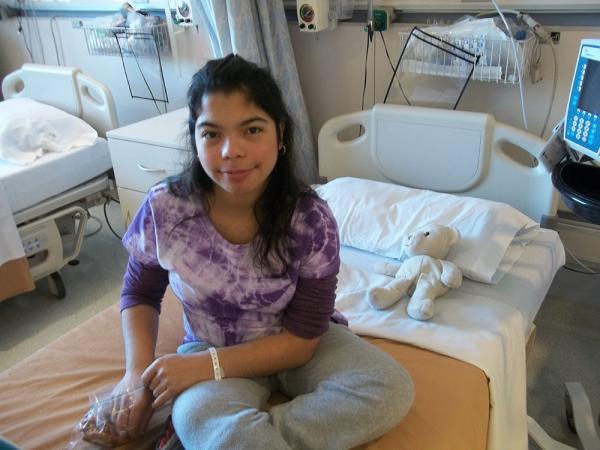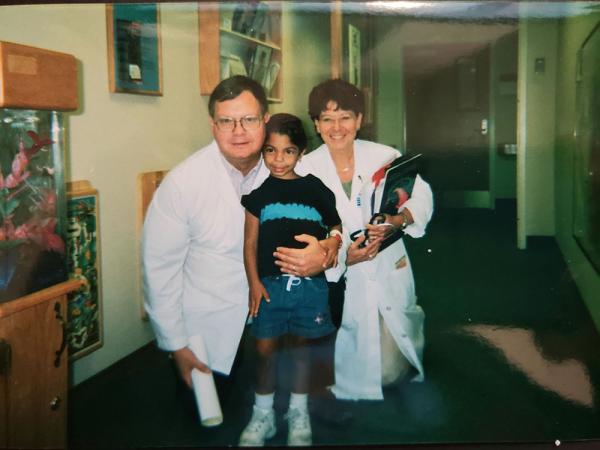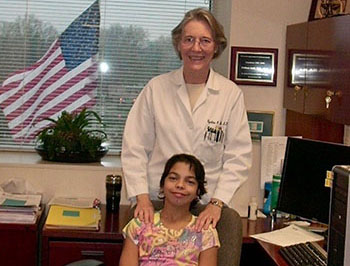IRP Clinical Trials Provide Irreplaceable Hope
Volunteering for Studies Allows Me to Help Myself and Others

Participating in NIH studies means I spend a lot of time in rooms like this one in the NIH Clinical Center.
Watching my dad carry the luggage to the car has become an all-too-familiar sight. It’s time for my mom and me to head to the NIH again, another trip in a lifelong journey for answers. I give my dad a long hug goodbye, and then I watch him stand alone in the driveway as we back away. The gravel arduously aches and crunches under our tires, a sound as uncomfortable as my symptoms even on my good days — few as there are.
I was born with an ultra-rare genetic disorder called abetalipoproteinemia (ABL), and I experience additional, mysterious symptoms related to a currently undiagnosed illness. I am also a writer, poet, aspiring playwright and a voracious reader, so follow me as I quote Arthur Miller’s “After the Fall,” which pretty much sums up my life: “You have been trying to keep the home fires burning and see the world at the same time.” Having a rare disease, I deal with constant challenges. Still, I want to see and experience the world. Unfortunately, I find the world often has a hard time adapting to me.
When I was diagnosed at 5 months of age, I was very sick. I was alarmingly undernourished due to consistent vomiting and diarrhea, and I showed some unusual skeletal features that my doctors could not make sense of. When I was 2 years old, my doctors referred me to Dr. Robert Shamburek at the National Heart, Lung, and Blood Institute (NHLBI), where I joined a study to evaluate patients for disorders that affect fat molecules, also called lipids, in the blood.

Me as a young child with Dr. Robert Shamburek (left), who runs one of the two NIH research studies I am currently participating in.
Particles called lipoproteins carry lipids, cholesterol, and certain vitamins through the bloodstream. In patients like me who have ABL, a transporter protein in the intestine and liver is missing, so fat molecules and cholesterol cannot be absorbed from the intestine or secreted from the liver into the blood. As a result, ABL patients must severely limit their intake of dietary fat, which can cause gas, bloating, abdominal pain, and diarrhea. Also, the low levels of cholesterol and lipids in our blood can lead to a low red blood cell count, resulting in anemia.
In addition, due to my low-fat diet, my body has a hard time absorbing vitally important, fat-soluble vitamins like vitamins E and A, needed for nerve health and vision. To try to compensate, I have to take several dozen fat-soluble vitamin tablets a day to stave off nerve and eye problems.
In addition to ABL, about nine years ago, I began experiencing new, extremely debilitating symptoms unrelated to my original ABL diagnosis, including frequent nausea, overwhelming fatigue, and pain. As a result, I am participating in the NIH’s Undiagnosed Diseases Program (UDP), led by NIH’s Dr. Cynthia Tifft. I was fortunate to join this protocol, which has diagnosed 25 percent of the more than 1,200 patients with undiagnosed diseases accepted into the program since its founding in 2008.
Extensive genetic testing performed through the UDP showed I have 15 genetic mutations, but only one is associated with a known disease: the ABL with which I have already been diagnosed. I am still a medical mystery, but I feel grateful and am filled with hope that doctors around the world connected to the UDP program through the NIH-funded Undiagnosed Disease Network are looking at my case in an effort to help me find the right diagnoses and, eventually, the right treatments.

Me with Dr. Cynthia Tifft, who leads the NIH’s Undiagnosed Diseases Program and is trying to figure out the source of the unexplained symptoms I began experiencing roughly nine years ago.
Dr. Shamburek and Dr. Tifft are not just amazing doctors; they’ve also been great mentors and supporters. They always let me know that I am more than a patient. I am part of their team — a team that works together to find answers and treatments. There aren't enough words to thank them for saving my life and for never giving up on me.
In addition to my wonderful doctors, my family and I have received tremendous support and inspiration from The Children’s Inn at NIH, where we stay for free during my visits to the NIH. The Children’s Inn is more than a comfortable place to stay. It also provides tons of free activities and free meals, but the best part is the welcoming, accepting, supportive atmosphere. Every child, young adult, and family at The Inn is there for the same reason as I am, and everyone supports everyone else. It’s the one place where I’ve always felt completely normal, even though my life has been anything but.
Participating in NIH research is a blessing for me. I hope I will find answers that will lead to an effective treatment for me, but even if I don’t, I pray my involvement will help others.
Throughout the uncertainty and daily difficulties of living with rare and undiagnosed diseases, I sometimes feel tired and alone. NIH is my irreplaceable source of hope.
Related Blog Posts
This page was last updated on Monday, January 29, 2024
